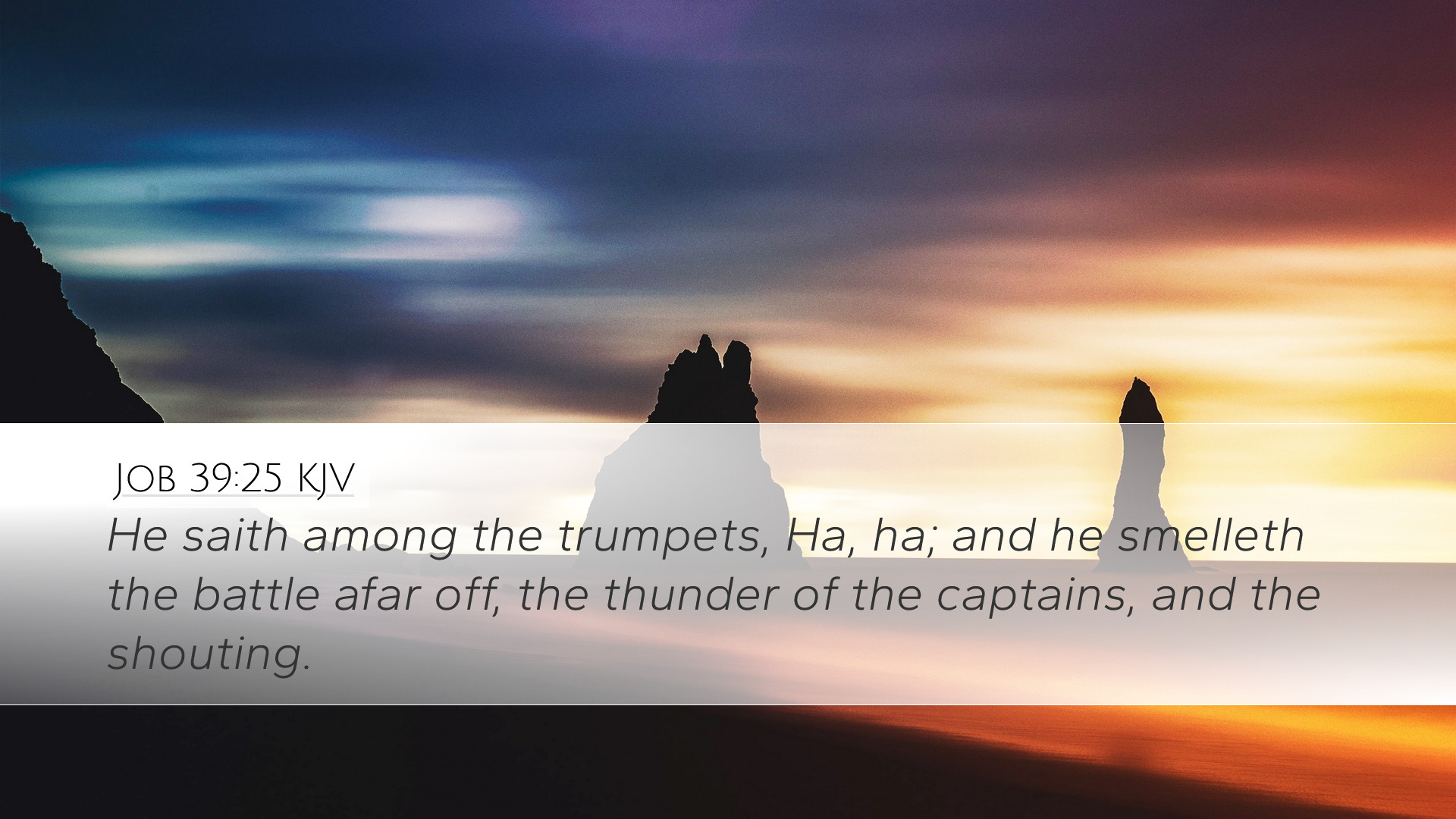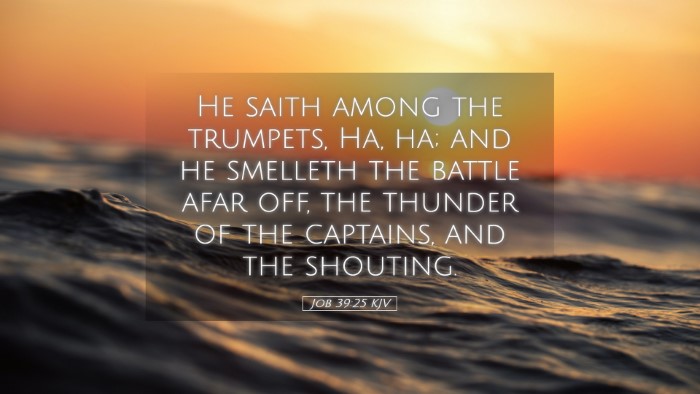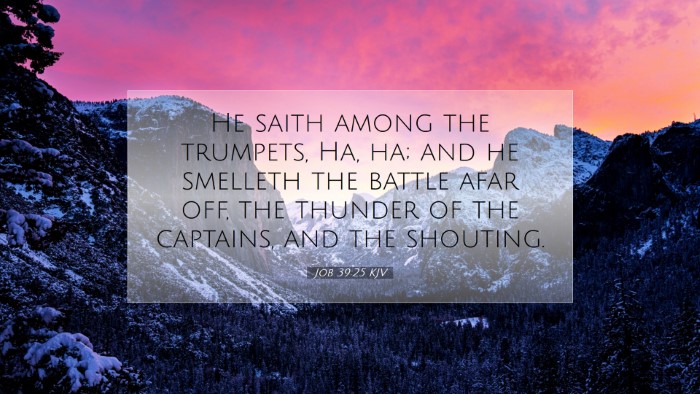Old Testament
Genesis Exodus Leviticus Numbers Deuteronomy Joshua Judges Ruth 1 Samuel 2 Samuel 1 Kings 2 Kings 1 Chronicles 2 Chronicles Ezra Nehemiah Esther Job Psalms Proverbs Ecclesiastes Song of Solomon Isaiah Jeremiah Lamentations Ezekiel Daniel Hosea Joel Amos Obadiah Jonah Micah Nahum Habakkuk Zephaniah Haggai Zechariah MalachiJob 39:25
Job 39:25 KJV
He saith among the trumpets, Ha, ha; and he smelleth the battle afar off, the thunder of the captains, and the shouting.
Job 39:25 Bible Commentary
Commentary on Job 39:25
“For he saith among the trumpets, Ha, ha; and he smelleth the battle afar off, the thunder of the captains, and the shouting.”
Introduction
The Book of Job, one of the profound pieces of wisdom literature in the Bible, deals with themes of suffering, faith, and divine sovereignty. In Job 39:25, we are presented with a vivid image of a war horse, highlighting its instinctive nature and sensory perceptions. This imagery serves as a vehicle for deeper theological reflection and is essential in understanding God’s creation and how it operates within divine providence.
Verse Context
In the broader context of Job 39, God speaks to Job about various aspects of creation, showcasing His power and wisdom in the formed creatures. Job has been questioning God regarding his suffering, and God responds by lifting Job's gaze to the wonders of His creation. Each creature described is provided as a testimony to God's sovereign rule and the order He established.
Commentary Insights from Public Domain Sources
1. Matthew Henry’s Commentary
Matthew Henry emphasizes the innate courage and strength of the war horse. He notes that the horse is not merely a creature of beauty but is specifically equipped for battle. This reflects God's intention in creation: each creature is designed for specific purposes. The horse's eagerness, as it “saith among the trumpets, Ha, ha,” symbolizes a readiness for battle, indicating a fierce and spirited character.
Henry further explains, "the horse smelleth the battle afar off," indicating an intuitive awareness and instinct that God has given to creatures. This awareness becomes a metaphor for the spirit of man in facing trials—the capacity for anticipation and readiness to engage spiritually in life’s battles.
2. Albert Barnes' Notes on the Bible
Albert Barnes elucidates the metaphorical implications of the horse's behavior in this verse. He draws attention to the expressions of eagerness the horse displays when it hears the trumpet, implying a state of excitement and vigor. He comments on its ability to "smell the battle," referring to the horse's acute senses, which enable it to detect conflicts even when they are distant. This alludes to the broader divine arrangement where God equips each element of creation with abilities suited for their roles.
Barnes further suggests that this verse invites readers to reflect on how created beings respond to their circumstances and the roles they fulfill under divine providence. The imagery encourages believers to confront life’s battles with the same instinctive preparation and fervor as the horse.
3. Adam Clarke’s Commentary
Adam Clarke expounds on the characteristics of the war horse, noting its majesty and the incredible strength it possesses. Clarke underscores that the horse's behavior, particularly its sound of anticipation "Ha, ha," demonstrates both readiness and enthusiasm for the impending conflict. This brings a dual significance to the verse: it speaks not only of the horse's physical traits but also of the representative nature of courage and commitment that believers ought to embody in faith.
Clarke also draws connections between the horse’s instinctual responses and spiritual preparedness. He highlights that just as a horse senses an approaching battle, so too should believers remain vigilant, ready to face spiritual challenges equipped with faith and courage.
Theological Reflections
The vivid imagery of the horse in Job 39:25 serves as a powerful reminder of God’s sovereignty over creation, illustrating that every creature has been endowed with unique abilities that fulfill divine purposes. The lessons drawn from this verse can inspire believers to consider their readiness to confront their struggles with the same alertness and courage as the war horse.
1. Divine Sovereignty
One of the core themes that unfolds in this verse is the sovereignty of God in His creation. By illustrating the way God fashioned the horse with a unique capacity for sensing danger and preparing for battle, the verse highlights the order and intentionality behind God’s designs. Each aspect of nature functions according to divine wisdom, reinforcing the understanding that God is intimately involved in the workings of the world.
2. Spiritual Readiness
Moreover, the verse calls for a reflection on the believer’s spiritual condition. Just as the horse is described as quick to react and engage in battle, believers are encouraged to cultivate a similar readiness in their spiritual lives. This includes prayer, vigilance, and reliance on God in the face of trials. It prompts an examination of how prepared we are to face our own spiritual battles.
3. The Nature of Suffering
The image of the war horse in the context of Job’s suffering reveals the hope that exists even within trials. The horse's instinctual rejoicing in preparation for battle can parallel the attitude of believers when faced with their battles. In suffering, there is an opportunity for demonstrating fortitude and faith; just as the horse embraces its purpose, Christians can embrace their struggles with faithfulness and hope, trusting in God’s greater plan.
Conclusion
In summary, Job 39:25 is not merely a depiction of a war horse in anticipation of battle; it is an invitation to examine the broader implications of God’s creativity, the nature of readiness in spiritual life, and the attitudes we adopt in times of trial. The insights drawn from esteemed commentaries enrich our understanding of this verse, ultimately serving to inspire and equip believers for their own journeys of faith.


